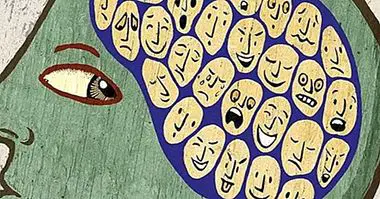Work addiction, related to psychiatric disorders
Addictions are usually culturally associated with the small pleasures of life that most of the population recognizes as such: sweet or carbohydrate food, Internet use, tobacco (for smokers), etc.
However, addictive behaviors can also occur related to tasks that not everyone can appreciate. Work addiction is an example of this .
Addiction to work and other associated psychopathologies
Workaholism, or workaholism in English, it may seem positive from the point of view of short-term productivity, but it has very negative consequences for health . The fact of devoting more time than necessary to work makes the rhythms of food and sleep change and look much more compressed in the schedules, that the hours of rest are scarce and that stress levels are triggered, besides impoverishing life social of people.
However, a study published recently in PLoS ONE links work addiction not only with health problems, but also fatigue and poor diet , and also does it with the risk of appearance of symptoms associated with mental disorders.
OCD, depression ADHD ...
The results show a correlation between work addiction and similarities with symptoms of disorders such as Obsessive Compulsive Disorder (OCD), depression or Attention Deficit Hyperactivity Disorder (ADHD). Thus, workaholics or workaholics have a tendency to present mental disorders in greater proportion than the population that does not experience this type of addition.
This research is based on the study of 1,300 people living in Norway, who filled out a series of questionnaire pages. Each of these volunteers received a score on a scale of workaholism based on options such as "how often in the last year have you worked so hard that your health has suffered for it?". But, in addition, the questionnaire included questions about indicators of certain mental disorders.
The link, or significant correlation, between the presence of work addiction and sets of symptoms associated with mental disorders arose once these data had crossed each other. Specifically, about 8% of the participants showed tendencies to workaholism , and among these people the proportion of people affected by disorders was much higher.
Specific, 32.7% of people whose characteristics coincided with those of the workaholic had symptoms associated with ADHD , while for the rest of volunteers the percentage was 12.7%. 25% of them could have OCD, and 33% had stress disorders. As for the proportion of people whose description matched the diagnostic criteria for depression among workaholics, it was 9%, being 2.6% among the rest of the group of volunteers.
Conclusions and reflections
These results are not so surprising if we consider to what extent the effects of the addiction to work in modern life can be extended. With the generalized use of laptops, tablets and smartphones with Internet access, the hours of work become, increasingly, the hours that were previously dedicated to leisure, and are mixed with housework and personal life out of the office.
The new workaholics do not have a clear reference to know when the professional facet ends and when the hours dedicated to leisure, rest or family conciliation begin. That's why, if before the addiction to work was limited to the walls of the building in which you work, now these walls have fallen and the horizon of possibilities to add hours to work (and restore them to private life) has expanded much beyond what, on occasions, is healthy.
In the light of studies like this we can come to a clear conclusion. The tools and strategies to prevent the appearance of work must bear not only the responsibility of becoming efficient workers in the long term, far from the burnout syndrome that can cause our productivity to plummet, but, more fundamentally, they must preserve our levels of health and well-being.



















